Back in 2014 when I first started my blog, I didn’t have a clue about how to make money blogging, let alone how much money was even possible to make from a blog. Flash forward to today, it’s even more shocking (still) that I’ve gone from learning how to make money blogging to now earning in excess of $50,000/mo from my blog.
If you’ve been reading my blog for a while now, then you’ve watched my journey going from earning just a couple thousand dollars in monthly side income supported largely by freelance clients, all the way up to now making more each month from my blog than I made per year in my first few jobs.
In 2019 alone, my blog made $451,238—with some months topping more than $58,000—all while I still held a full-time job for the first half of the year. Since then, I’ve been hovering around the same blog income level. During 2018, my blog generated $127,418 and the year before that, I broke the $100,000 mark for the first time. Check out my primers on how much bloggers can make & how long it takes to make money blogging for more.
How to Make Money Blogging in 2023: 12 Proven Ways (How I Make $451,238+)
- Sponsored Blog Content
- Affiliate Programs
- Blog Advertisements
- Sell Online Courses
- Physical Products
- Release a Software Tool
- Selling Your Own Services
- Writing (and Selling) eBooks
- Launch a Virtual Summit
- Business Partnerships
- Podcast Sponsorships
- Freelancing
Disclosure: Please note that some of the links below are affiliate links and at no additional cost to you, I’ll earn a commission. Know that I only recommend products and services I’ve personally used and stand behind. When you use one of my affiliate links, the company compensates me, which helps me run this blog and keep all of my in-depth content free of charge for readers (like you).
Now first, if you’re totally new to blogging today, I’ve put together the ultimate guide to getting started with creating your blog. Actually getting your blog online and well-optimized is the first step, and my 25,000 word guide to starting a blog will position you best for going on to make money blogging in the near future.
While it’s great to start considering ways to monetize your blog now, this guide is speaking more to those of you who’ve already built a blog and are looking to take it to the next level. If you haven’t yet gotten your blog off the ground, then head over to my ultimate guide to starting a blog.
Still Need to Start Your Blog First?
Check out my ultimate guide How to Start a Blog (on the Side) Today.
Last year alone, my blog reached over 4.4 million readers (like you) who’ve come to learn about blogging (my top blogging lessons here), marketing and business. It’s having highly engaged readers and an email list of 150,000+ active subscribers to my blog.
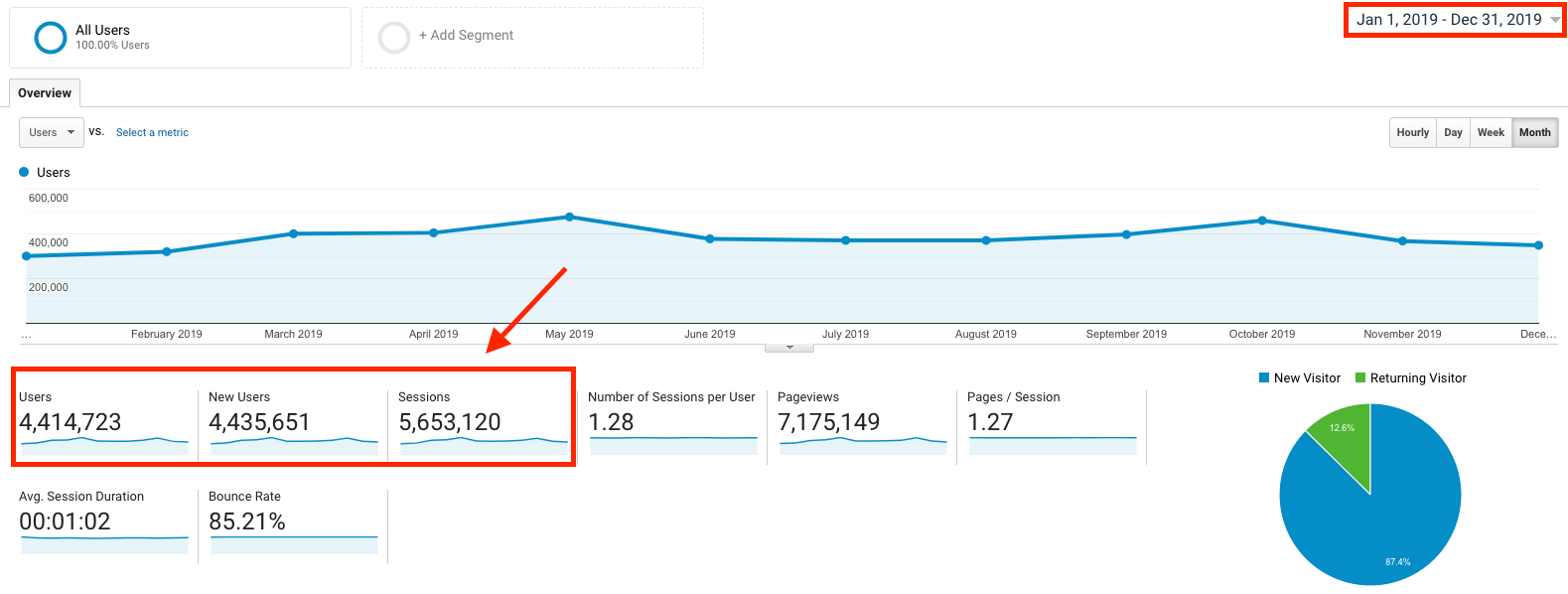
The more readers you have, the more options that’ll eventually be at your disposal to positively monetize your blog.
Laying a Foundation for How to Make Money Blogging in 2023
Before we dive in, let’s do a quick overview of what’s required to run a successful blog in the first place—because everything from picking a smart niche, to writing great content, developing your blog strategy and successfully driving traffic all come first. And yes, we’ll be talking about the role of AI tools in growing a blog—especially AI writing tools like my free paragraph rewriter and the full suite of AI content creation tools inside RightBlogger.
Want to skip the introduction and jump straight down to my 12 proven ways to make money blogging? Click right here.
It’s important that you have the key basics already taken care of first, so that you can be confident in getting a return on all the work you’ll be putting in to soon make money blogging.
Use My Free Keyword Research Tool

Try my free AI-Powered Keyword Tool to get dozens of research-backed ideas for keywords & topics to write about on your blog today.
Having each of these components in place will ensure that you remain successful, and continue to grow your traffic as you start monetizing your content.
How do you find a clear niche to blog about?
Have you figured out the niche topic area you’re going to blog about yet? Recent blogging statistics show that needs to come first (and is a necessary step before you actually make money blogging).
Ultimately, your blog niche isn’t only the topic or grouping of related themes that you’ll be creating blog content around, it runs so much deeper than that—and having that cohesive theme is essential because it gives your readers a reason to regularly return for more.
Here on my blog, every piece of content I publish somehow comes back to the overarching niche of building a blogging business.
This niche still gives me room to travel in a lot of different directions, while still staying on message with my 100+ podcast episodes and long-form articles I’ve written over the years.
Moreover, your niche explains the type of person that your content speaks most clearly to (and will inform on the types of content you produce). It’s a zoomed-in view of your expertise and experience. Ultimately, your niche is what will help you discover and grow your readership, market your content the right way, and monetize your blog successfully.
When you fully understand your niche and positioning within that niche, you’ll begin to develop a very specific (and engaged) audience, which makes it wildly easier to get sponsorships, partners, advertisers and deploy all of the other major ways to make money blogging.
What's a simple example of how to make money blogging?
If you run a DIY baking blog (your niche), companies that sell cookware are likely going to be one of your top supporters when it comes to making money blogging.
You’ll have a solid idea of who your target audience is (at-home bakers) and exactly what they’re hoping to accomplish (looking to improve their skills, get easy baking recipes, learn more about cooking in general). On the flip side, this also means that you can confidently communicate with sponsors about who’s consuming your blog content—and more importantly—why they’re likely to buy the advertiser’s product.
Listen to my interview with famous food blogger, Gaby Dalkin of What’s Gaby Cooking, to hear more about how she went from writing on the side, and learned how to make money blogging on a massive scale with advertisers, book deals, her own line of salsa products at Williams Sonoma and more. See my guide on starting a food blog for more if that’s the niche you’ll be blogging about.
After hearing this example, now imagine what it’d be like if you didn’t have a niche to blog about. Maybe you write about caring for plants, but you also like to write about psychology, with a bit of hiking sprinkled in. Not only is your audience all over the place, but they’re probably a little confused too. And that in turn will confuse your advertisers.
For that reason, I’ve chosen to launch my own hiking blog, Hike with Ryan. I’m doing this as a new side project with content like my guide to the best hiking trails in Yosemite National Park, a roundup of the top hiking boots around, my picks for the best hiking gift ideas, when to visit Yosemite and more—all as not to confuse potential advertisers and sponsors on my main site here.
Gardening companies probably won’t want to advertise where someone is reading instead about psychology-backed parenting techniques.
I know this might sound like an over-simplified example, but finding and sticking to a niche will help you stand out amongst the crowd of unfocused content, and will lay a solid foundation for your blog.
Is it important to write consistently in order to make money blogging?
The short answer is yes, you’ll need to publish (quality) content with some regularity if you hope to make money blogging in a long-term, sustainable fashion.
Let’s say you’ve got a little bit of traffic coming in to a few blog posts that are beginning to rank well in the search engines.
Need some more inspiration on what to write about? 👉 Check out my epic guide to the best blog post ideas you should cover today and grab my free blog post templates to get a jump start.
But once you’re here, it’s easy to think, “Well now that I rank #1 for this topic, I’ll just settle in there and reap the rewards.”
Trust me, I’ve been there. But as we’ve covered already, if it were that easy to make money, then just about everyone would be a rich blogger by now.
Once you’re starting to get a little content success and begin ranking, you’ll slowly get more and more traffic every week, it can be easy to think it’s alright to sit back and relax. And while blogs can sometimes be argued as solely passive income, ultimately if you want to make money blogging in a scalable long-term fashion, you have to be very proactive about getting those income streams into place… which takes a lot of real work.
If you want to make money blogging in a scalable long-term way, you have to be very proactive. That means writing a lot.
For me personally, I dedicate an average of 10 to 15 hours of time to writing for my blog each week—and that’s on the side of my day job still. If I could write more, I would. It takes a bit of sacrifice, and because I’ve learned over the years that my best thinking comes during the morning, I often get up at 5 AM to put in a few hours of writing before switching over to the tasks of my remote job.
I go into the nitty gritty details of all my blogging habits in my latest book, The Habits of Highly Successful Bloggers if you want more.
Now, you don’t have to follow my stringent personal writing habits, but you do have to write very regularly. The most successful, highest trafficked blogs post multiple articles each week—if not many every day. So if you’re wondering, do people still read blogs? the answer is a resounding yes.
My success at blogging is due largely to consistently publishing highly tactical, long-form content for my readers. That’s how I’ve grown my email list to more than 120,000+ subscribers tuning in to my weekly new articles. Having an email list of this size has afforded me a lot of opportunities.
And while you may not be striving to be the next Buzzfeed, if you want to make money, you should aim for ramping up to a point where you’re posting at least two to three high quality, sizable word count articles (in excess of 1,500 words) each month. That leaves time to spend promoting your content too.
Not only does publishing regular blog content generate more traffic, it brings returning readers. And those are the people that’ll help you over the long-term.
Moreover, it also shows your advertisers that you’re active and involved with your readers.
Is SEO (Search Engine Optimization) important to make money from a blog?
It’s really, really easy to write a lot on topics you care deeply about.
And it’s important that your blog becomes a place to share about things that are powerful to you, of course. But even more important is nailing your blog SEO (that’s something I wish I knew before starting a blog).
Search Engine Optimization can send even the most experienced professional marketers into a tailspin, but SEO is paramount to making money blogging.
Why? Because major search engines like Google can send you a practically unlimited amount of free, organic traffic—if you create content that’s worthy of ranking high in search results.
Now, we’re not going to do a deep dive into SEO in today’s guide about how to make money blogging (SEO is a major component of my paid course, Built to Blog), but I will tell you this—it’s crucial to always do keyword research, have a specific keyword phrase in mind for each blog post you’re writing, and to always do your homework up front in order to make sure that keyword phrase is something people are actually searching for online.
Ensuring that you’re following smart blog SEO best practices will not only help grow your blog, it will make you stand out as a leading industry professional if you can rank high in search results for competitive terms.
Plus, your audience will place more trust in you, as will your advertisers.
How do you build a community of engaged readers to monetize?
I’ll always be an advocate of finding and building an engaged online community. The most important thing is to focus your efforts on not just bringing in new readers, but on establishing real, tangible relationships with as many of them as possible.
Having an online community—whether it’s a forum on your blog, a Facebook group, email list, Twitter community or otherwise—can do absolute wonders for your blog. And ultimately, they’re going to be the ones that help you learn how to make money blogging in a way that’s a mutual win-win for both them and you.
Develop real relationships with your readers. Learn about their likes and dislikes, why they read your first article, how they discovered you, and why they keep coming back for more. Connect with them as humans, not anonymous readers on a screen. The investment will be worth taking a few minutes out to chat over email or on the phone every now and then.
In blogging, your community is everything. Build real relationships with your readers and you can’t go wrong. When you have a community, you not only have a deep rooted support system, you also have some very important relationships.
It may turn out that one of your readers is an advertiser that wants to promote their products on your blog. It may be a podcaster who wants to feature you on their next episode with 2,000 listeners with a spot for your blog pitch.
When you get a feel for your audience, and get to know them intimately, you can start asking them for support. You’d be surprised what you can get from a strong community of like-minded readers.
For all of my best tactics on bringing in new readers & creating community, check out my guide to driving traffic to your blog.
How many readers do you need in order to make money blogging?
Well, the answer to that question depends on how you’re making money from your blog and what your conversion rate is for each channel.
Of course, you’re not going to know your conversion rates right now, but once you start selling a product, pitching your freelance services, launching an online course, or reaching out to advertisers for blog sponsorships, you can calculate your conversion rates pretty quickly.
Here’s a quick example expanding on what your conversion rate could be when selling your own product—an online course—from your blog.
Let’s say you have 1,000 monthly readers. If 2% of those readers turn into paying customers for your online course, that’s 20 buyers. If your product is $10, that’s only $200. However, if your course runs $100, then you’ve just made your first $2,000.
Now, you can also look at this in a much more simple way.
- Fewer readers = less sales
- More readers = more sales
At the same time though, you can work on tweaks to get your conversion rate higher over time, and you can play with your pricing to increase average customer value as well. Sometimes math can actually be fun 😊
Of course, you need two key pieces of data in order to make these estimates:
- Unique Pageviews
- Conversions
To view the number of Unique Pageviews on your blog, dive into your Google Analytics Dashboard, go to Behavior > Site Content > All Pages.
If you’re strictly using your website as a blog, then you should see your top blog posts listed clearly with their corresponding number of pageviews.
You can set a date range (like the past day, week or month) and see your pageview count update. That’s how many people are reading your blog 👏
To get your conversion rate when talking about a direct product sale to a reader of your blog, simply take the number of product sales and divide that by the number of pageviews you’re seeing on your blog for a given date range—that’ll give you the percentage of readers that became customers.
Alternatively, to get a sense of how well your site is doing in the pursuit to make money blogging, you can take your total blog income for a given date range, and divide that by the amount of income you generated in that same period—that’ll give you the average value (in your currency) for each individual reader of your blog.
Now that you have a basic understanding of what a blog is, how to start building a community, picking a niche to blog about, nailing your blog SEO and tracking conversion rates, let’s get down to business.
How to Make Money Blogging in 2023: 12 Proven Ways (How I Make $58,234/mo)
Now we’re getting to the fun part…
Thanks for hanging with me as we covered the foundational steps that’ll help you get ready to profit from your efforts. It takes a lot of time and work, but trust me—the investment is well worth it in the long run.

In all honesty, there are dozens—if not hundreds of different ways to make money.
I’d like to tell you that I’ve tested all of them, but I haven’t. And after years of experimentation, there are about a dozen that’ve proven to stand the test of time and generate life-changing revenue for not only my own blog, but that of hundreds of others I know. For that reason, we’re focusing only on the most reputable, proven, broadly applicable monetization channels in this guide.
And what I can tell you is these top twelve ways to make money blogging (that I’ve both personally done and have been successful with) helped me turn this blog into a source of $50,000+ in monthly income.
These are tried and true techniques used by the most successful, most popular blogs you’ve heard of.
Make money blogging by getting paid for the content you create.
The first overarching theme we’re going to cover in this guide to getting paid for your content. This is the easiest and quickest way to start monetizing your blog. Of course, that’s also why you see so many bloggers pursuing this monetization channel.
The important thing here is to stay true to your blog, your expertise and to keep your target audience at the forefront of everything you create.
Let’s dive in!
1. Sponsored Blog Content

Sponsored content is a tried and true investment for brands of all kinds, and it works wonders in the right scenarios. This makes it a clear win-win of the many ways to make money blogging.
Over and over again, this method is not only proven to work for advertisers, it’s proven to help you at the same time.
What is sponsored content? It’s when company pays you a fee in return for you writing an article that’s either about them—or on a topic related to them, where their product, service or brand is prominently featured as the go-to resource for those of your readers that want to learn more.
It’s one of those sweet deals between a blogger and an advertiser where you’re both truly benefiting from the relationship.
Here are a few examples of sponsored content here on my blog:
- 35 Best CRMs for Small Business and Startups (sponsored by Close)
- How to Build a Content Marketing Strategy (sponsored by Skillshare)
- 18 Steps to Pitch an Idea to Investors and Customers (sponsored by Slidebean)
When sponsored content is done well (and not just a plain & simple advertisement), it comes across as genuine, unique, and free of a high-pressure sales pitch. In my opinion, if your sponsored post doesn’t lead with providing real value to your readers, then you’ve already gotten off track.
You’ve already built trust with your audience, so they trust you to recommend products that you know and believe in. That’s why I always recommend staying true to your audience when making sponsored content.
So how do you get sponsored? If you run a popular, heavily trafficked blog, you may already be getting sponsorship opportunities flooding your inbox. If that doesn’t sound like where you’re at today, then let’s talk about what it takes to get sponsored content offers.
For starters, identify a handful of products and their companies that fit perfectly into your niche.
Often, you’ll find that it’s products or services you’re already using yourself. Make a list of at least 10 products you’d be eager to advertise and could passionately support.
Next is the hardest part, and it’s not that difficult (I promise).
Go to the websites of your top 10 products and find someone who works in either marketing or PR at the company, and track down their email address using simple blogging tools like Hunter or Voila Norbert. Keep in mind that many companies who are open to sponsorships actively advertise a sponsorship email address somewhere on their contact pages.
Finally, it’s time to send them a cold email with your offer to partner up on sponsored content for your readers—with a heavy emphasis on why they should pony up the sponsorship dollars. Here’s a sample sponsor pitch email you can use in your blogger outreach (or brand sponsor solicitation):
“Hi Mary,
My name is Ryan and I love [your product]! I’m actively running a blog over at ryrob.com, and I’d love to see if we can partner up for a sponsored post on my blog.
I reach about [number] monthly readers right now and would also promote the post to my email list of [number] subscribers. Everything I write about is related to [your niche], and [your product] fits right into what my readers are looking for.
Do you have a few minutes to chat this week about if this would be a good fit?
Ryan”
This is just a rough example of what you can say when reaching out—and keep the focus on why the sponsor should be jumping at the opportunity to reach your audience.
Remember to always keep it personal too, you’re emailing a real person, not a robot.
Ultimately, if you’re planning on going the sponsored content route, you’ll need a media kit to highlight your sponsorship opportunities.
Having a media package is incredible important to not only attract the right business, but to set your prices up front. In this next section, I’m going to walk you through the right way to make a media package that will attract and sell the right companies.
Bonus: How to Create a High-Converting Media Kit
If you’re taking the advertising and sponsorship route, you’ll need a media kit that provides advertisers with key metrics and insights about your audience—to help them decide whether or not their sponsorship is worth the investment (like my deck here).
Don’t worry, a media kit is pretty simple to create using Microsoft Powerpoint or Keynote and you’ll immediately reap the benefits of having a concise single document to share with potential advertisers.
Having a media kit listed clearly on your blog (I recommend highlighting it on your contact and work with me pages) will let companies know that you’re open to sponsorships. Another benefit is that a media kit also shows clear fixed pricing, which helps you avoid low-balling, bad fit advertisers.
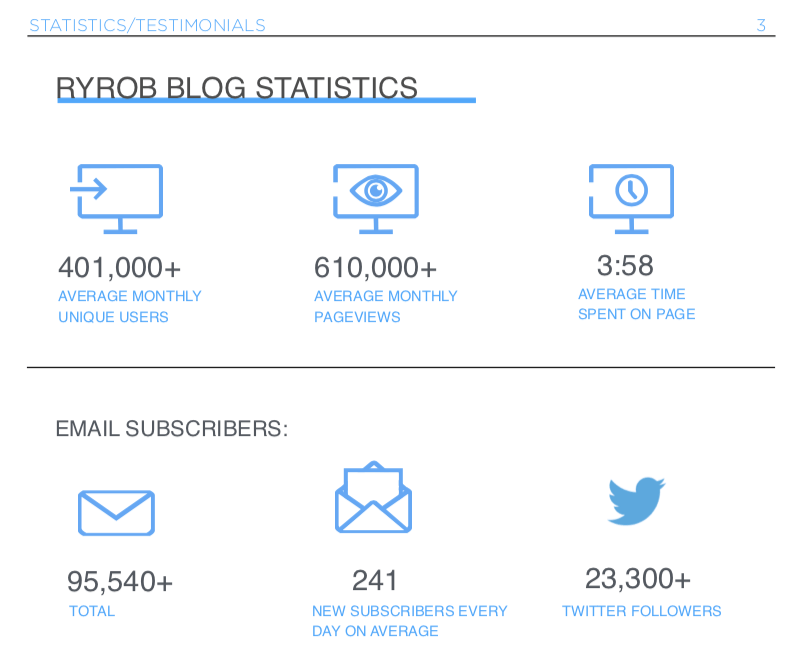
Here are the essential elements you need to include in your own media kit in order to land quality sponsors:
- A quick blurb about yourself. After all, you and your blog are the product. Why should sponsors invest in you?
- A breakdown of your readership. Who’s your audience? What are their demographics? What are their interests? What do they buy?
- Your traffic report. This is where Google Analytics comes in. You’ll need to show page view figures so advertisers will see how many people they’re going to reach.
- Advertising opportunities. What are you selling? Ad spaces? Sponsored blog posts? Podcast ads? Affiliate partnerships? Email marketing to your list? All of the above?
- Pricing. This can be the scary one at first, but if you make sure you’re pricing to fit your audience size (and engagement level), then you’re on the right track. Check out other media kits from bloggers in your specific industry to see how they are pricing their opportunities and how you compare.
As far as pricing goes, I now charge $2,500 for a sponsored post to reach my audience—but when you’re just starting out, it’s more common to command anywhere from $100 to $500 if you’ve got an engaged, growing base of readers that’ll move the needle for your sponsor.
Make sure your media kit is clear, concise, and visually appealing. Advertisers will want to download it and keep it while they’re making the decision to spend money on you.
You’ll also want to have an easy way for sponsors to get in touch with you, so that they can reach out and get the ball rolling with a quick email or contact form submission.
2. Affiliate Programs
Let’s talk about affiliate programs. Joining (and promoting) most affiliate programs is arguably easier than pursuing blog sponsorships, if you ask me.
Companies that have affiliate programs already built-in, are ready and willing to pay you money in exchange for directing them your blog readers—which means you don’t need to pitch sponsors or invest time into creating your own product before starting to making money.
But, in order to generate a meaningful income from affiliate marketing, it usually takes a good amount of traffic to your blog first.
For example, here’s a snapshot of my Bluehost affiliate revenue for the month of February 2019 where I generated $43,510.00 in referral fees from them…
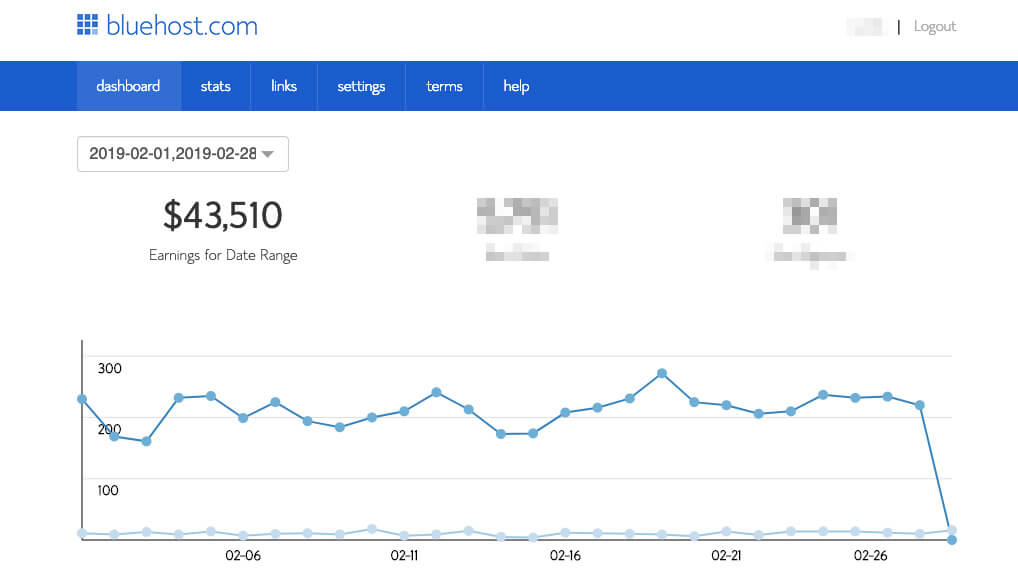
What I like most about affiliate programs, are that they skip the cold reach out phase that other channels like sponsorships and freelancing require. Plus, a lot of affiliate programs like the best web hosting plans (even ones with monthly payment web hosting plans) are well-automated to get you onboard and promoting quickly. Here are a few of my most effective posts at driving affiliate revenue:
- My in-depth comparison of the best cheap hosting plans for bloggers
- This explanation of shared hosting plans (and my picks for the top ones)
- My take on choosing the right free hosting plan or free blogging site
- This tutorial on how to choose a domain name that fits your blog’s niche
- A compilation of 25+ Bluehost reviews from around the Internet
- My breakdown answering the question, how much does web hosting cost?
- This review of the best eCommerce website builders on the market today
Much like sponsorships, you’re getting paid to recommend a product to your readers. The best part about affiliate programs is that many companies offer them. From the Amazon Affiliate Program to Target and eBay, all the way down to your little budding eCommerce companies with high-converting landing pages looking to jump on the affiliate train, there are tons of options for joining profitable affiliate programs.
For more on how to get started with generating affiliate income, check out this epic post about affiliate marketing here on my blog.
What Are the Best Affiliate Programs for Bloggers?
The best way to make money with affiliates certainly depends largely upon the niche you’re writing in. Here are a few of my picks for the best blogging affiliate programs:
There are a lot of affiliate program options out there, I know.
To avoid getting overwhelmed with this channel, my advice is to focus on just a few (proven) affiliate programs that have close topic tie-ins to the content you’ve been creating (like I’m doing on my newest side project SmartWP)—and know your audience is craving more of.
3. Blog Advertisements
Displaying advertisement space is arguably the easiest, most basic (and quickest) ways to make money.
Don’t get me wrong, I’m not saying basic in a bad way. I mean that simple advertising space is the core component when you’re first just starting out—and it’s the first channel I personally pursued. But because it’s so comparatively easy to do, it also tends to pay the least amount in financial return.
For context, this simple blog advertisement (pictured below) on my blog here generates anywhere from $800 to $1,200 per month in blog income based on around 300,000 monthly readers.
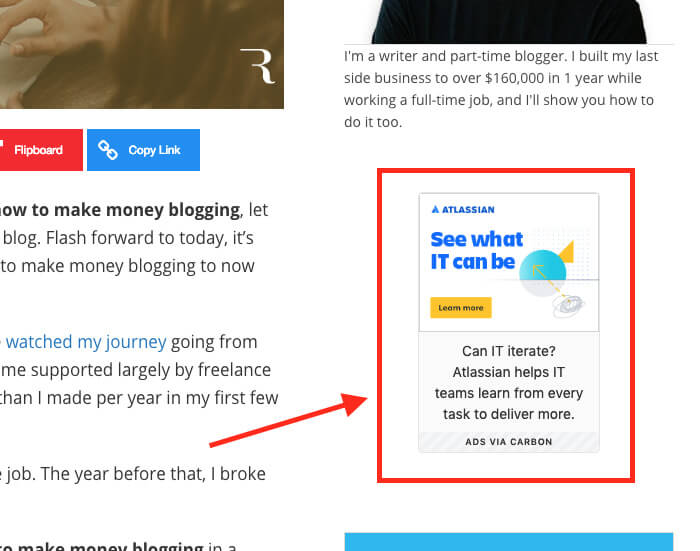
Of all the different ways to make money blogging that I’m engaged in, this is one of the lowest returns in terms of total dollars earned (especially for my amount of traffic).
The trade off however, is that it takes me zero effort on a daily basis to generate revenue with this channel since I’m an approved publisher with the ad platform Carbon Ads, that goes out and brokers deals with advertisers like Atlassian, Adobe, Slack, and hundreds of other tech-related tool companies that want to reach my audience.
Are blog advertisements still a legitimate way to make money blogging?
In short, yes. Advertising space is still an active component in many digital marketing campaigns, and for a good reason. Especially if you’re using intelligent software for tracking conversion rates. First and foremost though, blog ads are mimicking ads before the digital age—billboards, magazine placements, newspaper ads, and such. On the right blogs (especially if you’ve followed my guide about how to name a blog creatively), advertisements can be an incredibly easy way to get a brand’s name out and in front of the public eye.
And now that we’re spending countless hours on the Internet (with the average person spending 24 hours a week online), it’s easy to get ads in front of readers.
You can advertise on your blog and begin to make money blogging with this channel in a variety of ways.
The most popular, of course, is by starting with Google Adsense. You simply sign up, place a piece of code provided by Google on your site where the ad will go, and advertisers will bid on reaching your audience with relevant terms.
Keep in mind that when using Google Adsense, you don’t have a ton of control about what is being advertised on your blog. If you want to stay very true to your brand and keep your audience engaged, try another more industry-specific and tightly controlled ad platform like what I use (Carbon Ads) or look into other options that cater more closely to the audience you have—or want to drive in.
The 7 Best Display Ad Networks for Bloggers
Here are my picks for the best ad networks to evaluate for your blog:
- Mediavine (All topics)
- Carbon Ads (Business, Design, Development topics)
- PropellerAds (All topics)
- Google AdSense (All topics)
- Taboola (All topics)
- BlogAds (All topics)
- Media.net (All topics)
If you want to maintain a deeper control of the ads on your blog, then I recommend using a channel like Sponsored Content (above) where you’re working individually with a sponsor who wants to reach your audience. Plus, if you want to rely on advertising revenue, you better learn how to write a blog headline that really draws in new readers on a consistent basis.
Sure, you have to find companies in your niche that want to advertise on your site, but you’ll almost always be able to broker higher-paying deals with this approach.
Plus, over time as your audience grows, companies will begin reaching out to you for sponsorship opportunities.
Need Catchy Blog Title Ideas?
Try my free AI-Powered Blog Title Generator Tool to get dozens of SEO-friendly headline ideas to make your blog posts stand out today.
Selling Your Own Products and Services
Asking other companies to pay you in exchange for sharing their products with your audience isn’t the only way to make money.
When you’re still figuring how to monetize your blog, it’s important to consider what you’re really excited about (probably not advertising other companies products right?), as well as what you’re personally skilled at to find opportunities where you can sell your own products and services to readers.
Here’s a real life example of one way I make money blogging—by writing an eBook (and selling it to my audience like with this one, The Habits of Highly Successful Bloggers).
For example, if you’re a parent that loves to share parenting tips on your blog, but you have no intention of ever selling your own products to readers one day… then going the sponsored content and advertising route may actually be your best move.
On the flip side though, if you’re a chef who’s sharing awesome new recipes and you want to build a personal brand for yourself, then ultimately it may be a better goal to start the process by selling an eBook that’s a simple compilation of all your best recipes with beautiful images & step-by-step tutorials.
Testing the waters with an easy-to-create digital product can also pave the way for many exciting new opportunities to come.
- Maybe your eBook catches the eye of your favorite publisher and it leads to a print book deal?
- Perhaps a television network sees your growing following on YouTube and Instagram & wants to bring you onto a popular show in your niche?
- The possibilities that can come from first taking the initiative to create your own products and services are endless.
These top blogging books, blogging tips and blogging courses will all expand upon ways you can more effectively monetize your audience by partnering with them to offer win-win digital products.
Hopefully by now, you have an idea of what you like to do and what you’re skilled at, because from here on out we’re going to talk about how to make money blogging without needing to rely on outside advertisers.

Before we run through the many ways you can make money with your own content, I’d like to caveat this with a quick pricing discussion…
We’ve talked about how to price your sponsored content and blog advertising, but this next section is a little different.
When you’re pricing out anything you’re personally selling, make sure you’re considering your overhead blogging costs, rather than just choosing an arbitrary number that sounds good.
If you’re pricing a digital product like an eBook or online course, you may not think there’s any overhead at all, but it’s important to understand the skill you’re contributing (how long did it take to master?), the time it takes you to create, and what it’s worth to someone who’s going to consume and take action based on your content.
You may need to try a few different prices before you hit the sweet spot.
Definitely look at what your peers are doing to gather inspiration. Diehard followers of yours may buy regardless of the price, but others will certainly price-check before hitting the buy button on your blog.
4. Sell Online Courses

Do you have a skill you can teach others? Do your readers look to you for your expertise in a particular area?
Monetize that skill by creating an online course and you’ll be on the fast track to making money.
The best part? Creating an online course can be as easy as filming a series of a few short instructional videos that teach your blog readers how to do something meaningful based on your own blogging skills, experiences and successes. If you’ve excelled at something, there are people out there who would gladly pay to benefit from your expertise and accelerate their learning curves.
Major online course platforms like Udemy, Skillshare and CreativeLive all feature a wide variety of courses that range in length from 30 minutes up to 30 hours or more—with the longer courses naturally commanding higher prices because they’re often significantly more in-depth.
On the other end of the spectrum, an online course can be as time-consuming as you’ll allow it to be.
Here’s a shot of me filming a course several years ago that turned out to be a very in-depth, 30-day step-by-step process for students to follow along with. Needless to say, it took a while to create all the content, but it was also one of the most impactful courses I’ve ever launched for my students.
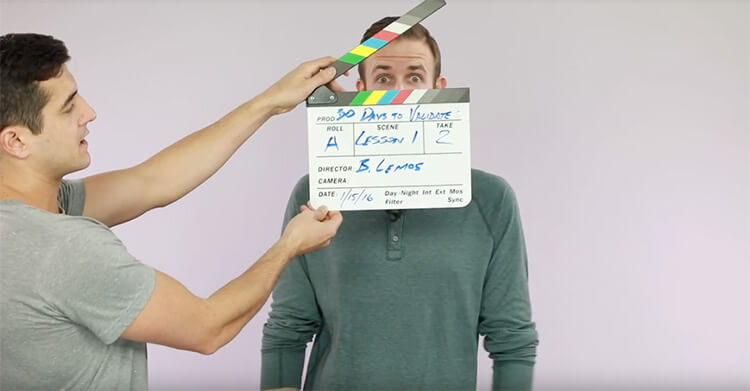
My advice as you’re still learning how to make money blogging with online courses, is to start with creating a short-form course (less than 60 minutes of video content) on a very specific niche topic that can be taught without too much hand holding along the way.
Take it from me… I’ve created 4 online courses over the past 5 years—all of which have been different in size, scope and topics—you’ll want to start with creating a simple course your first time around the block.
How Do You Create Your First Online Course?
First, you’ll have to determine which skill or process you want to teach (and how long it will take someone to learn it).
Then you’ll need to validate that course idea with your readers, or otherwise go out and start conversations with your target customers, to ensure there’s actually a paying audience for the course you want to create.
The social media marketing niche is a great example for how you can make money with an online course…
Let’s say you’re killing it on Instagram, and your readers want to know how you do it. You can put together a course that teaches them step-by-step how to be an Instagram pro. Different modules of your course could focus on distinct topics like:
- The basics of shooting engaging photos
- How to find your ideal posting schedule for your audience
- Writing enticing captions and leveraging hashtags
- Going from 0 to 1,000 followers in 90 days
An online course like this would be a great example of evergreen content—a how-to guide that students can run through and implement on their own time—meaning it can be a relatively hands off “set it and forget it” style asset, rather than something where students need to tune in for weekly live sessions.
That makes this style of course a very attractive way to generate revenue.
Health and wellness plans are another great example.

If you’re a fitness blogger, bodybuilder, nutritionist, or anything of the sort, consider selling something like a 30-day plan for your specific practice. This could include:
- Video tutorials of how to do specific workouts
- Meal prep schedules and nutrition guidelines
- Shopping pointers and cooking recipes
- Weekly workout plans (take my free blog planner for example)
- Online community support
All of these different components would be designed to work together and get students to a common end goal or transformation.
The sky’s the limit when it comes to selling online courses.
As always thought, make sure the course is actually relevant to your audience before investing tons of time into creating it.
Validating your course concept can be as simple as tweeting about your idea, talking about it on your Instagram story or sharing a short blog post that asks your readers & followers if this course is something they’d be interested in.
Feel out their feedback, ask the most engaged readers to put their money where their mouth is by pre-ordering the course at a steep discount (the only true validation is whether or not people are willing to pay for your course) and then you can confidently create your course based on the feedback you receive.
I’ll soon be compiling my own guide to creating (and selling) online courses. For now though, here are a few more of the best resources I’ve found when it comes to learning how to create your first online course:
- Build a Six-Figure Business Selling Online Courses
- How to Sell Your Own Online Course Without Marketplaces
- How to Create, Sell and Profit from an Online Course
Again, focus on keeping it simple for your first online course.
As you get more courses out to your audience, you’ll fine tune your process and learn how to perfect this way over time.
5. Physical Products

Right, right… I know you probably started a blog because you’re thinking, “I don’t want to be in the physical product space, Ryan. I just want to write and make money blogging without building products and shipping packages all day every day.”
And I get that. I personally don’t sell physical on my website (anymore), but hear me out on this one because a lot has changed over the past few years.
You no longer need to stock your own inventory—you can dropship your products without ever having to print a shipping label or stock up on cardboard boxes yourself. This relatively hands-off approach makes selling products a pretty attractive way to generate revenue today.
What is Dropshipping?
Dropshipping is a business model you can use to run an online store without ever holding any inventory yourself.
Once you’ve made a sale from your blog, your supplier (a warehouse that packs and ships orders for sellers) will ship your products straight to your customer’s doorstep—for a fee of course. But, you’ll never have to worry about storing, packaging, or shipping your products.
If you want to sell physical products, let’s take this a step further… you don’t even need to actually create your own products anymore.
You can find an existing product category on the market today (with proven demand and paying customers), then find a supplier on a site like Alibaba that’ll create a private-label a version of that product, so you can start selling it yourself.
Alternatively, if you don’t want to go through the (often time-consuming) process of searching for suppliers, you can go with a print-on-demand platform like Printify that gives you easy access to create & print your own designs on more than 250+ different products. On top of that, they also handle the fulfillment and shipping.
Examples of just a few private-label products you could sell include things like:
- Vitamins, protein powder and nutrition supplements
- Yoga pants and women’s activewear
- Backpacks, speakers, chargers and other travel accessories (if you’re a travel blogger)
- Makeup and cosmetic products
- Check out even more ideas right here
And remember that you’ll also need to quick set up an online store that’s closely connected to your blog in order to collect orders, gather customer information, collect payments and update your orders along the way.
Oh! Now let’s take this real-life blog example from my own former business into account.
Today, my friend Matt still runs the private-label phone case business we launched together after college.
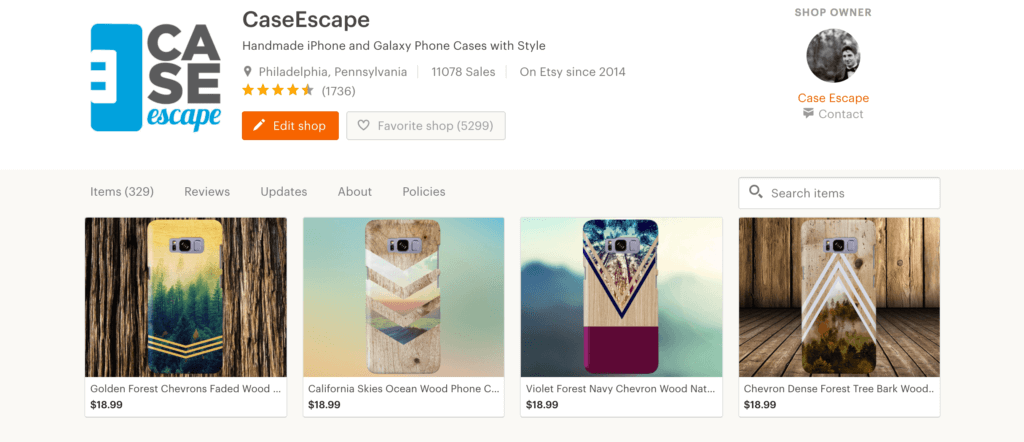
After finding a few online suppliers that could make us high-quality phone cases with the kinds of designs we saw trending on sites like Etsy and Amazon, we launched the business and grew it to a $160,000 side project within our first year by being good at marketing through Facebook and other online channels.
Plus, I’d started a company blog that was teaching other people behind-the-scenes of how they too could build a phone case business.
And for those that were serious about getting started, we sold them equipment and training on how to launch their own version of the business we’d perfected—creating a new revenue stream and leading to one of the first ways I learned how to make money blogging.
Selling physical products is a personal choice that you need to decide for yourself based on the niche you’re in and the kind of business you want to start.
Physical products are great when you’ve got a diehard group of readers—or the product aligns very naturally with your niche and there’s proven demand for it.
If you’ve got followers that’d be excited to wear your brand, then you can even go the swag route. I’m talking t-shirts, mugs, prints and other branded gear you can host online & have dropshipped by a printer.
If the product fits your audience naturally, then start testing it out.
6. Release a Software Tool

Are you a full-stack software developer by trade? If not, maybe you’ve got a good friend or former co-worker who is.
In its most simple form, a software tool is something that people (your blog readers or even freelance clients) can use to automate a process—or series of processes—and avoid doing the task in more manual ways.
To give you a rather meta example of this in action right here, my blog runs on a theme called OptimizePress (for my CMS, WordPress). That WordPress theme is a software product I purchased, and because they release regular updates, they charge an annual subscription in order to receive updates & premium support.
It’s possible to run a blog without using WordPress or a theme like OptimizePress, but the very visual nature of how this theme works, means I never have to touch a line of code or learn any coding languages in order to operate my blog on a daily basis.
When OptimizePress first launched, they created a software product that dramatically simplified the process of running a visually appealing WordPress blog. That’s worth paying for, and I’ve been a customer for going on six years now.
Software and other digital products in this vein aren’t confined solely to things like WordPress themes. Other examples include things like:
- Mobile applications
- Productivity tools
- Email marketing service providers
- Customer relationship management tools (CRMs)
- Even video games
If there’s a process or series of tasks people do on a regular basis, software can be built to help automate or streamline those activities—and if you have an audience of readers that share in this same challenge, you can quite easily make money blogging by solving their needs through software.
The fun part will be working hands on with a handful of readers to create and perfect your software before releasing it out into the world.
7. Selling Your Own Services

Selling your time, skills and expertise as a service aligns pretty closely with selling online courses (and freelancing, which we’ll expand upon later).
However when it comes to selling your services, there’s one major difference from selling courses—you’re working either one-on-one or in a small group with a client to give individualized help or deliverables.
The common theme though, is that you’re once again finding a clear skill you already have, and using it to make money blogging.
Services you can sell (amongst many, many other ways to make money online) include things like:
- Consulting with companies on an hourly basis
- Designing logos on sites like 99 Designs or Dribbble
- Coaching individuals on a monthly retainer
- Writing copy or blog content for brands
- Editing podcasts and using your audio engineering skills
- Doing search engine optimization projects for online brands
- Making websites or software tools for established companies
- If you’ve got a skill, it can be offered as a service…
As services are often performed on a more one-on-one basis, and include working closely with one client at a time, that means this won’t scale in the same way that affiliate income or course sales will.
However, it can still be very lucrative if you’re charging premium rates to established clients—making it well worth your time.
For example, let’s say you’re a business coach…
You can sell a course on how to market your business that’s priced at $150. If you’ve got a large audience, this could be a phenomenal way to make money blogging.
If your audience isn’t huge yet though, you can take the approach of instead offering a smaller group of people a one-on-one coaching package for $500, or even a done-for-you service where you charge a monthly fee of $3,000 to manage all of their social media channels and grow their following.
It’s a number’s game, and it’s up to your to determine your worth and your time. That being said, here’s my guide to pricing your freelance services in a way that allows you to actually make money blogging & still put away some savings at the end of the year.
Where to Find Clients That Need Your Services (and Expertise)
Later on in this guide, we dive much deeper into freelancing (working with companies) as a specific way to monetize your blog. But for now, here are my picks for the best places to find ready and able customers for your service offerings.
- 36 Best Blogging Jobs Websites to Get Paid Blogging Work
- 78 Best Freelance Jobs Websites to Get Great Clients (Fast)
- 55 Websites to Find High Quality Work From Home Jobs
- 60 Places You Can (Quickly) Get Great Remote Jobs
While selling your services won’t scale as beautifully as many of our other ways to make money blogging here, it’s a very easy place to start.
8. Writing (and Selling) eBooks

We already touched briefly on why writing and selling eBooks (your own digital product) is another great way to make money blogging—largely because of how scaleable your income can be without the need to put in any additional expenses after the book is written.
With each new sale you generate, the vast majority (if not all) of the profit comes straight to you, when selling an eBook from directly on your blog and collecting payments via Stripe or PayPal.
No middlemen. No publishers. No distributors. No retail stores.
This means that when you learn how to write an eBook and sell it, you’ll keep the absolute maximum possible profit margin on your eBook sales.
eBooks have been one of my dependable sources of passive income over the past few years, and they’ve been crucial to my own personal journey—in a way that benefits my readers as much (or more) than myself.
Here’s a snapshot of a sales report showing how much I’ve made from just one of my eBooks (The Habits of Highly Successful Bloggers) since releasing it:
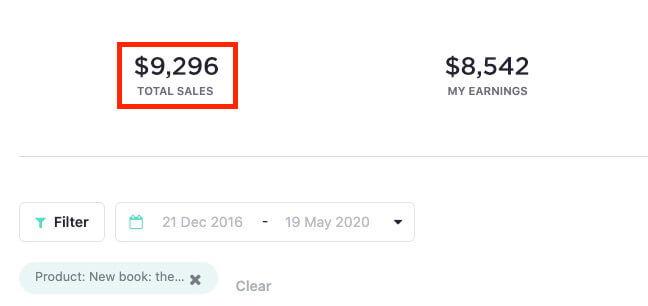
That’s $9,296.00 in eBook sales that took next to zero effort from me.
This eBook is an asset I created almost a year ago. Aside from updating it a few times a year, it’s a pretty autopilot way of monetizing my blog just from the readers that discover it after reading one of my blogging-related articles.
Not a bad way to make money, right?
I’ve got one major disclaimer for you though… it’s because I’ve invested a lot of time and effort into creating high quality, long-form articles (like this one you’re reading right now) that drive traffic to my blog from search engines, notable publications and social channels that I have an engaged audience regularly buying my eBooks.
Lastly, it’s important to clarify that when I’m talking about eBooks, I mean digital books in the form of downloadable PDFs. This eBook format is so simple to make and sell these days.
That being said, you can go the extra mile and take the Amazon eBook route which also allows you to sell Kindle formatted eBooks and audiobooks both on your own blog and to the hundreds of millions of Amazon customers out there.
Cookbooks, fiction, self-help, weight-loss, non-fiction: you name it, there’s a market for an eBook on it.
If you’re confident that you have the knowledge to share, and can write well, then an eBook could be one of your best ways to make money blogging given your skills and experience. Just be sure to begin with writing an outline.
The fact that you already have a blog with existing readers should give you the confidence that you have something worth reading—maybe it’s time to put that content into the form of an eBook.
If you haven’t yet gotten your blog off the ground, then head over to my ultimate guide to starting a blog.
Still Need to Start Your Blog First?
Check out my ultimate guide How to Start a Blog (on the Side) Today.
9. Launch a Virtual Summit
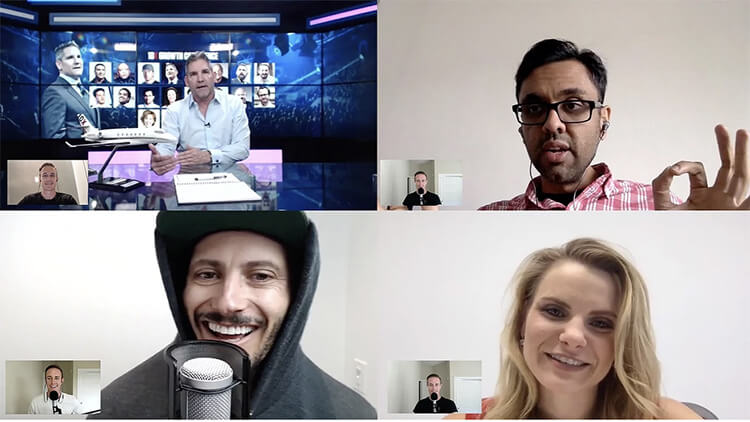
Yep, you saw that right. Little old me in the corner of each of these video interviews 👆
In 2017, I was hired by Close to single-handedly plan, produce, launch and orchestrate a virtual summit—their Inside Sales Summit. Over the course of three months, I recorded 55 video interviews with some of the world’s most recognizable entrepreneurs and salespeople.
I built a complete website using one of the best website builders around (WordPress), got the site up and running with a managed WordPress hosting plan in order to host the virtual summit, created every page, edited the videos, designed the graphics, established our promotional partnerships and wrote the launch email sequences both Close and all of the partners used to promote the event.
It was a lot of work. But, this side project netted me $30,000.
And it’s only because of my blog that Steli and the Close team originally decided to work with me.
Getting paid to interview 55 of my business heroes?
Now THAT is a pretty amazing way to make money blogging.
But just getting paid to produce a virtual summit for another company isn’t the only way to generate revenue with this monetization channel. You can host your own virtual summit.
Like I said, virtual summits are a lot of work, but with that work can come wild profitability.
A virtual summit is a live (or pre-recorded) event covering a specific subject with multiple guest speakers in tow. This is why I’m consistently harping on the importance of finding your tribe.
If you have a group of like-minded readers on your email list, each with their own communities that align with your messaging, then you’ve got the audience a virtual summit just waiting to be invited.

A virtual summit is the culmination of all the above ways to make money.
You’re teaching, you’re coaching, you’re selling. Think about your audience and what drives them.
- What do they want to learn?
- How can you help them?
- Do you have enough content to create a summit?
When you’re feeling confident in how you answered these questions, then start planning the event.
- How many speakers do you want?
- Is this going to be a live webinar-based summit or in-person?
- Who would attend and when should it be?
Make sure to give yourself plenty of time to put your summit together.
Then promote, promote, promote.
How Do You Make Money Blogging with a Virtual Summit?
Well, there are a few different ways to monetize a summit.
The most straightforward way (and easiest to execute your first go-round) is selling tickets for admission. Anywhere from $20 to $200 is common depending upon your industry.
You can discount pricing for early birds. Ask all of your speakers to promote the event to their audiences as well.
Another way to monetize your summit, is by making admission to watch “live” free and then selling an all-access pass to anyone who wants the ability to watch the speakers they missed (or watch again).
With both approaches, you can sell your audience another product after the event wraps up—maybe an online course, eBook or coaching package that expands upon the concepts covered during the live summit.
At any rate, creating a virtual summit will probably be your main focus for the quarter.
If you’re going the summit route, you’ll also want to make sure you have other monetization in place while your attention is focused solely on this project.
Use Your Own Talent to Make Money Blogging
You’re skilled. You’re experienced. Your audience believes in you.
If you’ve made it this far—and you have a blog with real readership, you’re golden, my friend. You’ve got talent and now you’re just learning how to monetize your blog.
Maybe the monetization channels we’ve discussed so far weren’t the best fit… or maybe you’re already using them and want some more ideas.
Well, in this next section, we’re going to talk all about selling yourself (in a good way that monetizes your blog).
10. Business Partnerships

When you have a growing blog, you have an audience.
And when you have an audience that’s regularly coming back for more of what you’re giving them—you’ll create opportunities for unique business partnerships as a way to further monetize your audience.
Business partnerships can shake out in a lot of different ways, so it’s difficult to explain just one.
A business partnership can be as easy as an affiliate relationship like we’ve already covered above.
However, it could also mean…
- Working with a tech company to white-label their app and sell that version of it to your followers
- Partnering with another blogger to create a product together and market it to each other’s audience
- Scoring your own salsa line with Williams Sonoma after your food blog takes off (like Gaby Dalkin has done)
The point is, I keep talking about the importance of building your audience.
This applies just as much to establishing win-win business partnerships.
Find other companies or individuals that align with your audience, your blogging goals, and most importantly—your plans for how you want to make money blogging.
From there, all that’s left is finding a way to work together so that all parties benefit.
11. Podcast Sponsorships

If you’ve been telling yourself just how much you need to start a podcast…
Well, now is your chance. It’ll be a lot of fun, plus it can significantly help you.
My podcast is typically an annual source of anywhere from four to five-figures in sponsorship revenue, with sponsorships from brands like Freshbooks, Monday.com and Skillshare coming in at around $500/episode to get in front of my 30,000 monthly listeners.
Sure, when you’re just getting started you probably won’t be able to command similar sponsorship rates because your show likely won’t immediately have thousands of listeners tuning in to hear what the show’s all about.
It’ll take time to go from choosing the best podcast hosting platform, to launching your show and building up your listenership. However, if you’ve already done a good job of creating content and attracting regular readers to your blog—you can launch your podcast with a bang by promoting it heavily to your existing readers.

The best part about choosing to start a podcast as way to make money is that it can be relatively low effort once you’ve got the tools and process down (compared to writing massively epic blog posts all day every day).
Start Small with Podcast Sponsorships and Set Yourself Up for Success.
If you’re short on time, you can start by taking your existing blog posts, turning them into spoken word and starting to regularly post them as podcast episodes that talk through all of the most popular content from your blog (and share previews of what you’re working on right now).
Over the course of your first few months podcasting, you’ll likely attract more listeners very steadily if your show is entertaining and you discuss interesting topics or bring on exciting guests. Promote your blog and podcast by doing thoughtful blogger outreach to pitch yourself as a guest on other podcasts, offer up guest blogging and building a social community to regularly share new content with.
Once you’ve got a podcast with some regular listenership—then you can add podcasting to your media kit and start charging sponsors for podcast ad placements like 30-second pre-rolls, mid-rolls and post-rolls that plug your sponsored products and services.
12. Freelancing

Freelancing isn’t for everyone, but it’s certainly a good option when you’re still in the process of deciding how to make money blogging.
In fact, up until just a few years ago, freelancing made up nearly 90% of my blog income. And moreover, the relationships I built with freelance clients during my first few years of blogging, are what positioned me to make money blogging from other (more passive) sources today.
As we’ve already touched upon, if you’re a skilled writer (or at least enjoy it enough to improve over time), then perhaps you could start freelancing on the side to share your expertise with clients who are willing to pay.
👋 Want to learn how to start a freelance business on the side of your day job? Read my ultimate guide on how to start freelancing.
Especially if you’ve already grown your own blog to a respectable level and can demonstrate to clients that your content attracts & engages readers.
Now, becoming a freelance writer could be your shot at helping other brands, startups and bloggers to do the same thing. That’s exactly where freelancing comes in to play. It doesn’t need to just be writing though.
You can sell your services by:
- Consulting with marketing teams at established companies and teaching them how to create content
- Becoming a hired gun that re-writes website copy and suggests improvements to better attract customers
- Coaching other writers and bloggers who want to achieve the same results you have
Never forget that you have a skill that can be used to make money blogging—even if that’s simply from trading your time for a little extra side income today. Be sure to check out my list of the best websites to get blogging jobs online (if you want to monetize your new writing skills with some paid gigs)—or if you’re a developer by trade, consider these WordPress developer jobs sites.
If you’re not ready to dive into some of the more time-intensive ways to make money blogging, or if just want to make some extra revenue while you chip away at those larger projects, then freelancing may be your best call. Just be sure you have a smart blog layout that’s designed to route potential clients to your services page where they can learn more and hire you quickly.
How Will You Make Money Blogging This Year? Action Items
How are you feeling about your blog? Are you ready to take action and monetize your blog?
Your speed to action will be the largest determining factor in just how successful you become. All the perfect blog business planning in the world won’t make things happen.
So my call-to-actions for you today are this…
- If you haven’t already, launch your blog right now (follow my step-by-step guide to starting a blog)
- Decide whether or not you’ll pursue a longer-term route to make money blogging (with a higher return)
- Begin taking small steps toward creating that asset, pitching yourself or otherwise bringing it to life today
Still Need to Start Your Blog First?
Check out my ultimate guide How to Start a Blog (on the Side) Today.
I highly recommend making a list of your personal picks for the best ways you can make money blogging, based on time and effort, as well as viewing these through the lens of activating your own skills & interests.
It’ll take time (months) to go from launching a brand new blog—to learning how to make money blogging, but the effort is well worth the payoff.
Once you have an idea of the time it’ll take to bring your preferred route of making money blogging to fruition—and an estimate of just how much money you could potentially make from that channel—then it’s pretty easy to decide what you should focus on.
For many new bloggers, as you just get started—it’s common to focus on low-effort, mid-profit ways to make money blogging in the early days. It’s a good way to dip your toes into monetizing your blog, just don’t make the common blogging mistake of trying to monetize your content too early at the expense of not building strong connections with your readers. For even more, check out my guide about how much do bloggers make?
Then once the first dollar (or $100, $1,000 and even $10,000+) hits your account, you’ll have a better understanding of the work it takes to make money blogging in your niche—and what it’ll take to accelerate to the next level. Just be mindful of how to deal with your taxes, too—I recommend bookmarking my guide about taxes for bloggers.
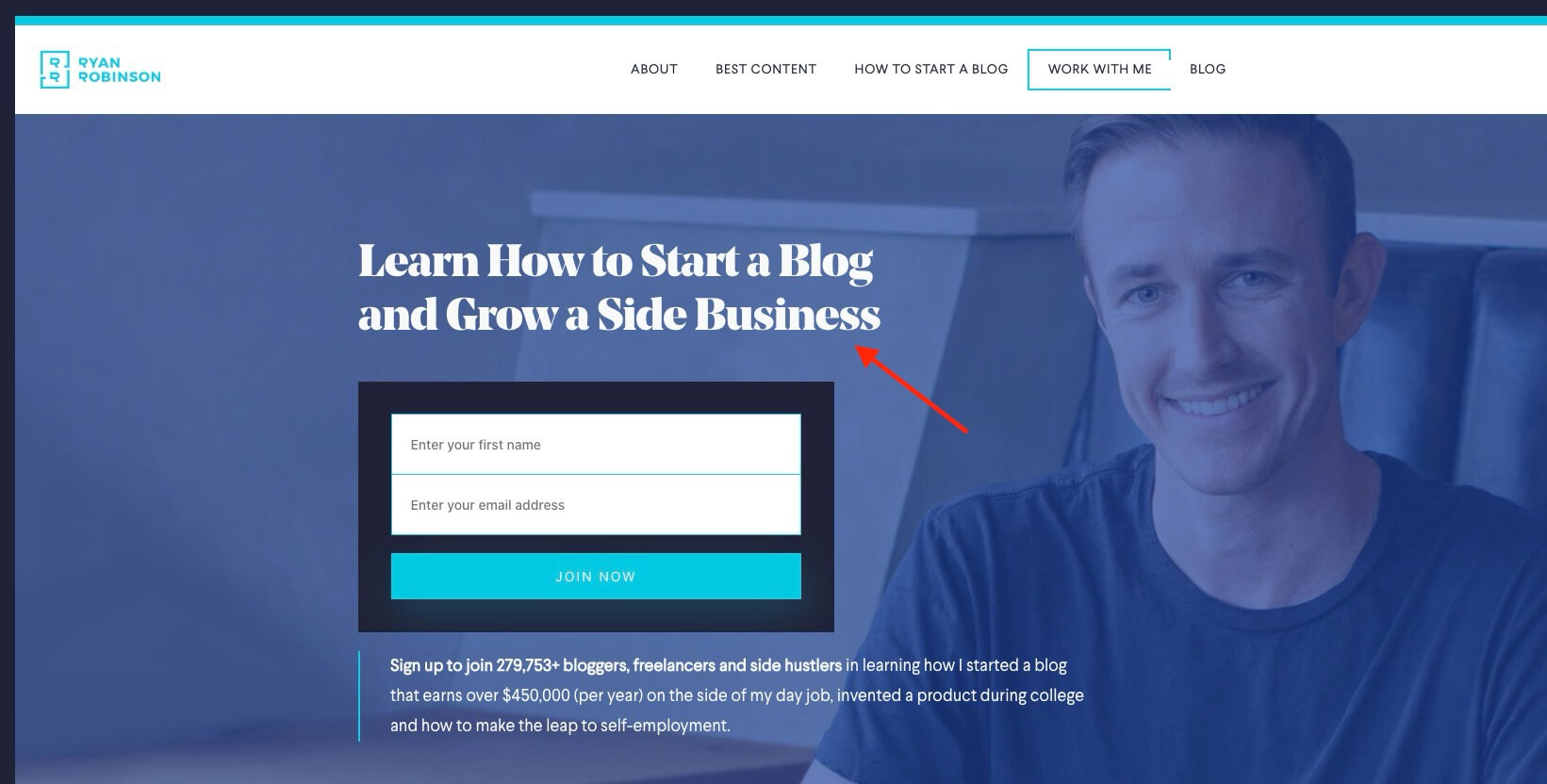


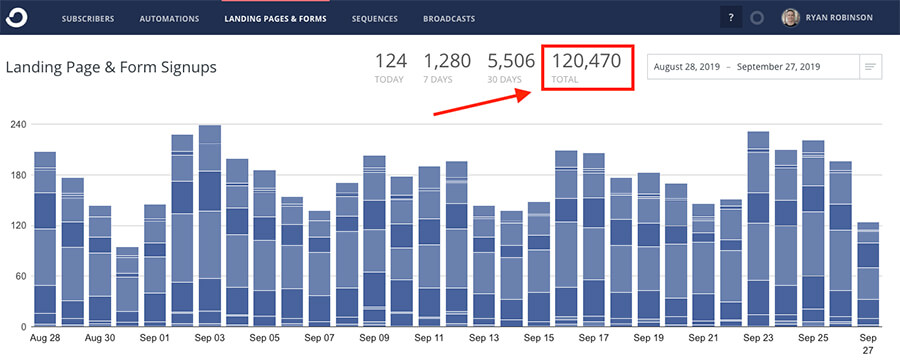
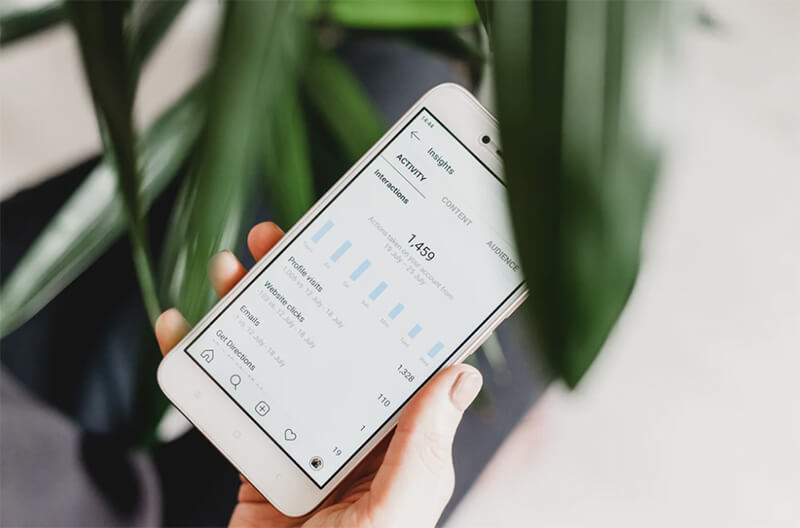


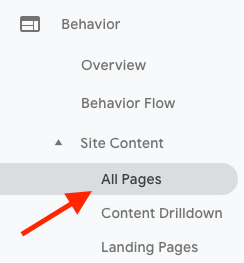
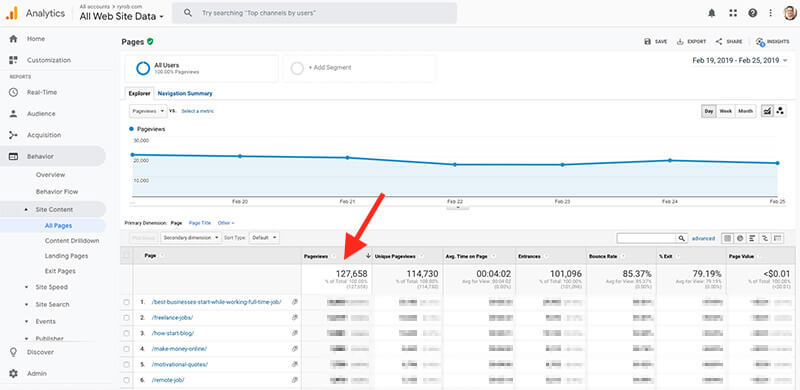
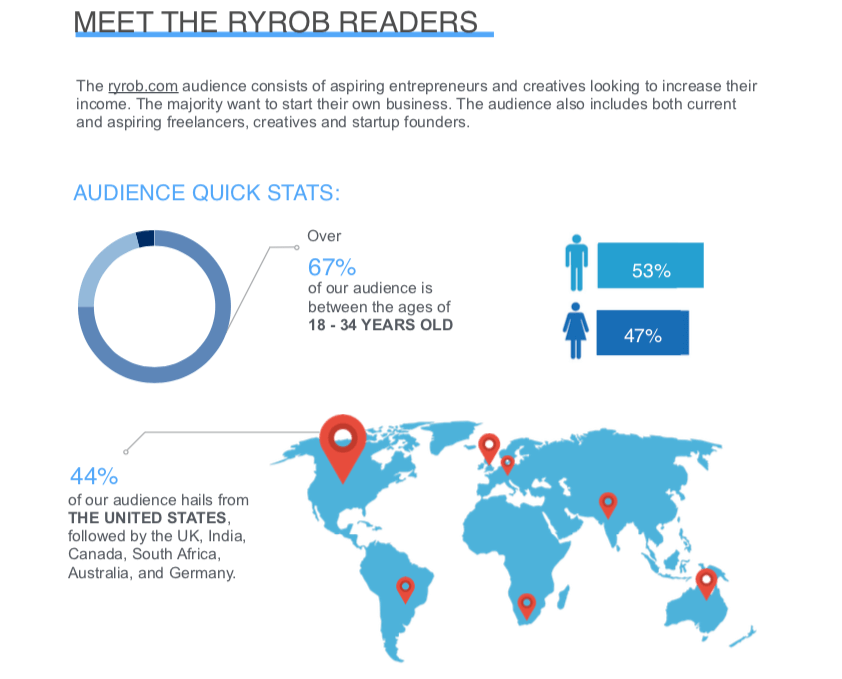

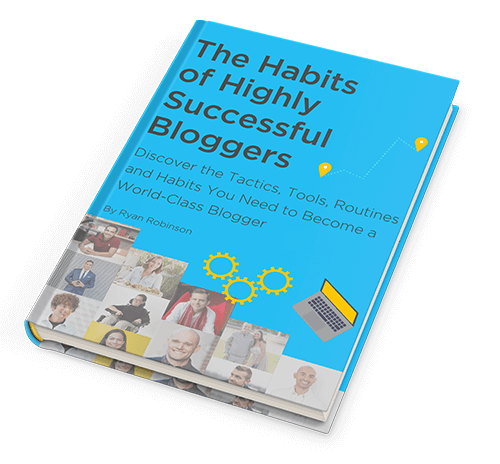
344 replies to “How to Make Money Blogging in 2023: 12 Proven Ways I Made $451,238+ Blogging This Year (Free Guide)”
I have a saying about blogging and it goes a little sumptin like this…
“The blogs is the army + the navy, not Jay-Z. We respect the ladies & kiss the babies!” 🙂
And most importantly…
“Bloggers and internet marketers are silent rockstars, because we’re just as BIG as U.S. politicians!” 🙂
It’s amazing how anyone can start out blogging with 0% experience and use past adversity and creative writing expertise to achieve “side hustle millionaire” status.
Blogging is a labor of love. I always tell people it has to be something you want to do because it’s a patient process of working towards achieving [side hustle millionaire] status. The process of building a blog can be fun and worthwhile and get anyone featured in Forbes magazine and across many news networks. But blogging has to really be something a person wants to do if thy want to go from an infant side hustle and accomplishing the business transformation of going from employee to entrepreneur.
There’s millions waiting to be tapped into through the affiliate marketing and a blogging side hustle alone that it’s virtually mind boggling. This is why I LOVE this industry.
The kid from “Flatbush Brooklyn” in on the rise! 🙂
Haha love it.
Agree with you that one of the most magical things about blogging is that you can start on day one with literally zero experience, teach yourself the ins & outs of what it takes to create successful content and eventually get to a place where you can actually make money blogging in a sustainable fashion.
My blogging journey took me 5 years to get where I am today. It wasn’t easy and it took a lot of patience in trusting the process, repeating what worked well, ditching what didn’t and continuing to experiment with new ways to both drive traffic and monetize my blog. Appreciate you! 🙏
Hello Rob, I always enjoy your articles, I have been struggling with my business and wanted to get some feedback from you. The brain supplement business is a little different than others and I am trying to get more readers to go to my site and of course order some of the brain supplements I sell through affiliate marketing. Anyway, I was wondering if you had any ideas you could throw at me. I appreciate any comments or feedback.
Thank you.
-Erik Bredemeyer
Thanks for the kind words, Erik! Happy to weigh in here with some feedback for you.
From spending just a few minutes jumping around through a couple posts on your blog, my first reaction is that you have A LOT of very surface deep content that goes very quickly from introducing the topic at hand—to trying to sell readers on clicking through & buying one of the products you’re an affiliate of. It’s not to say that can’t work in some cases, but at least in my experience… that’s not the best approach to building a sustainable business.
My advice would be to scale back the quantity of content, and focus much more on the quality/depth of publishing just a few articles each month instead of one short piece every day or so. If your goal is to eventually drive traffic from search engines, then you’ll need long-form content that’s much more in-depth than what you’re publishing right now. Aim for more like 1,500+ words per article and the longer, the better (when it makes sense to keep going).
I found your blog by chance, you’ve put together some amazing content (especially this guide). Thank you so much!
Thanks so much, Sharon! Good luck on your journey to learning how to make money blogging. Let me know if you have any questions as you go 🙂
Thank you Ryan for your great explanation on the various sectors of blogging. I am new to blogging so I wish to stay here and learn as much as I can.
I am here to learn so teach me all that you can. I have also taken note of your advice – patience is key in blogging.
I will be watching your every move going forward. I wish you the very best of luck and great wisdom as you continue to explore the boundaries of blogging.
Stay blessed
You’re very welcome, Joseph! I’m pumped to hear this feedback 🙂
Patience is definitely key in blogging—it’s definitely possible to start monetizing your blog early on with success, but it’s only after you’re consistently driving a solid amount of readers to your blog that you really start to make money blogging in a way that can really move the needle.
Keep me posted on how things go with your blogging journey!
I read your post and I’m Student. I also want to be Digital marketer like you. I have a Blog. When I read your Article then I think I want to write a Blog post on Passive Income. After a week later I will write the blog on Passive Income It is not like you it is a little bit different than you and also short. I want to say your post is incredible on Passive Income.
Thank You For giving me this incredible Passive Income Post.
Hello Ryan, this is the best content I’d ever read on this topic.
Had seen a handful, but you just nailed it uniquely like a pro.
Thank you very much for this piece Ryan.
I’ll be checking for subsequent posts.
Boom! Thanks, Raphael. Good luck in your pursuits of making money blogging, I’m rooting for you 💪
Ryan this is quiet a massive write you’ve put here, i am inspired. But i have a challenge and that is writing for my blog. I have in the past hosted different blogs on different niche trying to find out what works at last i have discover that just like any other full time job blogging requires time committed to it. Thanks a lot for been my inspiration
Your content is wonderful. I always love your articles podcasts.
Thanks for making this amazing blog.
Achieving millionaire status is possible for the average everyday working-class American in transition from employee to entrepreneur. All they have to do is believe and combine faith and works in action at full strength.
And a WHOLE LOT of work 💪
Amazing content.
I’m Brazilian, but I always keep an eye on tips from foreign sites. “You are on another level” For sure, I’ll be back here. 🙂
Thanks for sharing.
Thanks for the kind words, Jay <3
Hey Ryan, I plan on selling private label physical products eventually but right now I’m at the bottom with no business at all, blog or otherwise. In your opinion do you think it would be better to start said business on a blogging platform and eventually sell physical products through that channel or do you think I should start on an e-commerce platform like Squarespace or Shopify that has blogging capabilities but isn’t primarily a full fledge blogging platform? Also does your “Built to Blog” program have a private Facebook page/ community so someone can network with like minded individuals, or something similar to that? Thank you and looking forward to hearing back from you.
Hey Logan! Great question, and I’ve got to start my answer by sharing my personal bias—the experiences I’ve had here with my blog, really reinforce to me that if you build a steady stream of traffic, email subscribers joining your community, and have an engaged audience tuning in to everything new you release… that creates a pretty endless stream of opportunities in terms of future products to release.
So personally, I’d opt for the starting out with a blog/content play to begin testing the water into your private label product business. Why? Because you can validate your business idea for less than a couple hundred bucks tops (going toward getting your blog live a la https://www.ryrob.com/how-start-blog/). If you can figure out how to drive in targeted readers that are likely to become customers for your eventual product, you can start pitching those people on why they should buy your product (especially as you begin collecting a small trickle of email subscribers coming in). You should check out my validation challenge post when you have a moment too, I think it’ll spark some serious ideas for you (https://www.ryrob.com/validate-business-idea/).
Built to Blog—yes! We’ve got a private Facebook group for members of the course where it’s primarily question & answer driven discussions where we give each other feedback, I weigh in with answers to the specific questions y’all have, and generally be as helpful as possible. I find that I also tend to carry on lengthier conversations with most students over email where we can get into the weeds without sending everyone a FB notification too.
it seems to me that it’s difficult to break out of blogging quickly. A lot of people start blogs and run cool content. It’s hard to break the idea that someone is already developing XX time. Personally, I have a plan for a blog but it’s probably only for myself. I never thought to have a profit from it probably more to do something more than ordinary gray man 🙂
It definitely takes time, hard work and delayed gratification to get to a point where you’re profiting in a meaningful way from a blog. That’s been my personal experience at least (3 years to generating a six-figure side income from my blog).
I’ve had many bloggers on my podcast (https://www.ryrob.com/podcast/) though, that’ve taken very clever paths to monetizing their blogs MUCh quicker with things like taking a skill/strength, building a small but engaged little niche audience (a few hundred people even) and then launching a premium online course/coaching program to that community and working very hands on with them to get real results. From there, relaunch a more hands off course a few months down the line as you still attract more of an audience, get referrals, etc. Mike Pearson’s episode on my podcast comes to mind if you want to track that one down and check it out.
This is a high quality article and very detailed. Thanks for bringing the value and real statistics to help others. Really great of you. I enjoyed this one a lot! Thanks Ryan!
You’re welcome! Bringing real numbers, proof and statistics to the table in these kinds of guides helps a lot in my experience.
Thank you so much for sharing Ryan !
Truly inspirational to us.
You’re welcome, Jonathan! Glad you got some value out of this guide.. it took quite a while to create (and continually update) ha! 💪
When you put the AdSense code on your blog you have a choice of the style of advertisements (large images, small images, text, etc.) and also where they are placed. The more prominently the ads are displayed the more likely they are to be clicked.
👏
Ok, first this post is deep. I enjoy reading your post. It always hold great values. When I started my first blog it dn’t go well. It was difficult getting my post in front of the readers. After a few year I discovered a quick and easy way to get my readers active through email.
Love it! Growth and monetization take time, regardless of how you’re learning to make money with your blog. I’m glad you stuck it out and are starting to see some results with your email list now 💪
Hi Thank you for this great article.
Just a quick qt, when we have several blogs, do we have to say who we are in each blog and show our picture?
I do not want to be seen as jack of all trades, master of none. How to best do this and yet be trusted, etc by your tribe….?
if I use pen name – is that ok? sounds fake ?
A very inspirational post Ryan! That’s quite a number of ways to make money with blogging! Looking forward to see more of your posts!
Much appreciated, Ray! 🙂
Thank you so much for sharing this detailed breakdown.
You’re welcome, Adit! 🙏
Thank you for writing one of the most wonderful articles ever on monetizing a blog.
It felt like you were talking right to me when I was reading.
Ah! That’s too kind of you, Kumar. Glad you found it so helpful and I’m pulling for you in your own pursuits to make money with your blog.